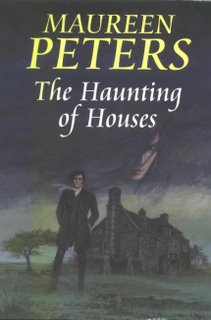
Some months ago,
we talked about Maureen Peters' new book The Haunting of Houses. The editors,
Robert Hale Ltd Publishers, kindly forwarded us a copy and now that we have read it, we can properly review the book.
We will try to do so without spoilers, but this will be somehow difficult. The novel can be pigeon-holed as a sequel of Wuthering Heights. Not exactly a pure continuation of the story ( as
Return to Wuthering Heights by Nicole Thorne (aka Anne L'Estrange) ), Maureen Peters's novel explores Heathcliff's character inside a narrative that works in different metaliterature levels.
The novel mixes the Brontë's background (in particular the Irish origins of the family) with the narrative itself in a way that somehow brings to mind
Emma Tennant's Heahcliff's Tale but with a completely different approach. If Tennant's intention was to build a fiction supported by real characters and real settings, Peters's novel inserts the Brontë sisters, Haworth and the Pruntys background inside the geography and the story of Wuthering Heights as fantastic elements that destabilize the narrative. The reader is left with an unstable feeling. Different realities coexist but you have only a glimpse of them.
Of course, the novel fills the holes about Heathcliff's runaway and how he became rich. But Maureen Peters gives meaning to her options. That is, without revealing anything. What Heathcliff did in those years is of most importance concerning what happens after Heathcliff dies, in particular about the future of Hareton and Catherine. But Ms Peters doesn't try to answer all the questions and fill all the gaps. She suggests and slips clues around the novel so that you can infer what the origins of Heathcliff are or the reason of the solid attachment of Nelly Dean to the Earnshaws.
The novel does not always accomplish the same level of fluidity. There are some tedious repetitions (especially when the events of Wuthering Heights have to be retold time and time again), some shocking, out-of-context metaphors (
the sky was a pale azure, blank and featureless, like the eyes of murdered children) and the reasons behind some actions of the main character, Aspen Stewart, are not always properly explained.
Nevertheless, we have here a pleasant reading for all Brontë and particularly Wuthering Heights lovers. And of course, and more importantly, you can discover what happened to Emily Brontë's second novel!
Categories: Books, Wuthering_Heights, Review, Sequels









0 comments:
Post a Comment